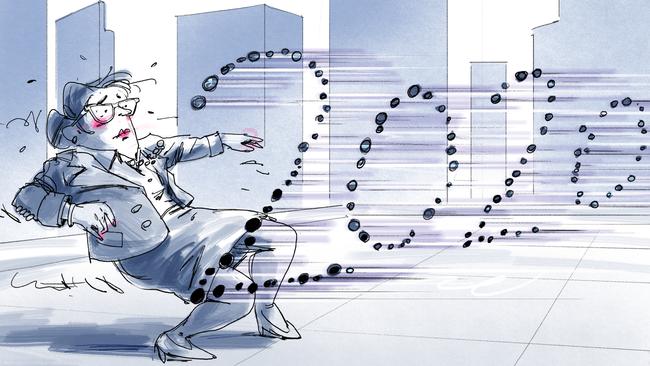Recruiters looking for new skills in post-pandemic market
You won’t be blamed for losing your job in 2020, but employers want to see more than regret and fear of the future.

A favourite question of recruiters goes something like this: tell me about a time when things didn’t work out for you. The question is aimed at discovering qualities of resilience, adaptability, ingenuity, the energy to act and the ability to reflect. Next year, they’ll only have to say: tell me about your 2020.
This is the year when everyone feels as if they’ve failed. This is the year when everyone in the workforce discovers their levels of resilience, their ability to adapt, their capability to reflect and learn.
Next year we’ll discover what employers really think of those struggles. The relationship between employers and employees has rarely been tested like this and, while most are still scrambling in crisis mode, the post-pandemic world of work will likely see a clash in priorities. The battles of 2021 will be between workers who want to continue working from home and bosses who want to get back to the office; between a workforce thirsty for secure work and employers intent on keeping work flexible; between workers who want to try out new careers and bosses who want work-ready employees.
It’s difficult to overstate the impact of COVID on the workforce. There are one million Australians unemployed and 6.6 million being propped up by JobKeeper. There are pilots working as traffic lollipop men, flight attendants working in Woolies, chief executives working behind Zoom screens and academics working as contact tracers. Few know where they’ll be working next year. Even those who are still in jobs have found themselves with fewer hours, working from home, using new technology and often stalled in their career path. No new projects, nothing new to tell about themselves for the next interview and, sometimes, feeling survivor’s guilt.
Temporary shift
On the other side, organisations have been relying more on temporary staff and will continue to do so until conditions improve; they are likely to expect more of employees and, given the unemployment levels, they can afford to be choosy.
The great realignment of 2020 is apparent in a survey just completed by Seek. Four out of 10 people say COVID has made them rethink their career and a quarter of people intend to apply for jobs in different industries in the new six months. And, when they look for work, security will be top of mind. Two-thirds of jobseekers say security is more important than last year and two-thirds would accept a lower-paying job in return for job security.
Employers, however, may not be impressed with the great rethink. As recruitment expert Carl Piesse puts it, “a lot of people will want to change jobs or careers, but if you ask, is it a good time to do that, I’m not so sure. Employers will be less willing to take a chance on someone at the moment. They want industry background and technical expertise, and people who will hit the ground running.”
If there is a common ground, it is that now is the time to start working on the future career. Seek consultant psychologist Sabina Read says: “Many are still full of fear. They’re worried about losing their job in the next round, some have survivor’s guilt and many are worried if they’ll get a job at the level they once had. But instead of focusing on the fear, the loss and the embarrassment, they should be asking, ‘What have I learnt about myself during this time’; and in that response they can create a meaningful story about a challenging year.
“When they say, tell us about your 2020, if you say it’s been shit, that’s not going to fly.”
“Everyone talks about resilience — that is, thriving in the face of adversity — and this is a great opportunity for showing that. It’s also an opportunity to pivot or change direction, especially if they might have been stagnant in their career path. Ask yourself: ‘How can I throw my net wider, what are my transferable skills?’ There are practical things, like doing courses, upgrading the CV, networking and generally making the most of the downtime, but this is as much about getting your own headspace in check. When they say, tell us about your 2020, if you say it’s been shit, that’s not going to fly.”
Stability prized
A measure of the fear in the workforce is the rush for stable jobs. ANZ general manager of recruitment, resourcing and mobility Rita Newman says: “What may have been an attractive company to work for pre-COVID may not be now. If I think about the number of job applications we’ve seen, it’s obvious that people are looking for more job security.”
But even within the pillars of the big banks, adaptability will be key. Says Newman: “The need to match resources to critical business demand is one of the big shifts we’ve seen and that will continue post-COVID. That will impact the types of work people do and it challenges the way we think about work. People should be open to secondment and short-term work; they should see them as opportunities and think about their career in a less linear way. It’s less about the job title or the promotion and more about building experience, paying more attention to capabilities, asking for mentoring and getting involved in work that stretches people.”
If resilience was the go-to quality of the past few years, adaptability has trumped it in a year when pilots are directing schoolchildren at crossings and restaurateurs are baking bread. Piesse, who is regional director at Hays recruiting, says when the group surveyed employers for the top soft skills they were looking for, “the top three were communication, adaptability and teamwork, and adaptability is critical because there’s a lot more change happening in organisations now”. And when organisations talk about adaptability, it’s not long before they mention that euphemism, “realistic expectations”. Says Piesse: “People should have realistic expectations and, if you’re not seeing opportunities for yourself out there, then you’d better reassess. When markets change, you have to pitch yourself at the right point.”
Writing your own story
The importance of creating a story around a bad year is mentioned by many in recruitment. In interviews, they won’t waste much time exploring what went wrong in 2020, they want to hear what you learnt, what you did about it, how you built your identity capital, how you expanded your skills. They may not want a recipe for sourdough but, as Piesse says: “If you say you stayed at home playing Fortnite for months, it would not be looked upon favourably. A simple thing they can do is look at development and upskilling, whether that’s listening to relevant podcasts or TED talks, following industry leaders on social media or anything that demonstrates you have a commitment to your field and can talk broadly on your topics.”
Newman concurs: “Be open to opportunities but be selective, don’t apply for everything because you’re feeling anxious. Think of how to get learning opportunities, build your network, write a blog, involve yourself in virtual community work, leverage social media to engage in relevant conversations. This period is a true test of character, of leadership, of trust and adaptability, and when people go to interviews it’s important to share those in interviews.”



To join the conversation, please log in. Don't have an account? Register
Join the conversation, you are commenting as Logout